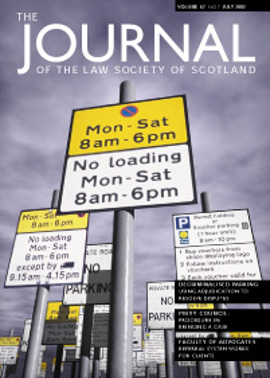End of an era
To be involved in a case which goes as far as the House of Lords is an experience not given to many Fife solicitors: to discover that the case marks the end of the career of the legend that is Lord Mackay of Clashfern was to make that experience very special indeed. Others will pay tributes more eloquent than mine to the man from Sutherland who is arguably the greatest legal mind of his generation. During the proceedings, my view of him was largely obscured by faded silk gowns and grubby wigs; however, the presence was there throughout. Calm and courteous for the most part, his questioning of counsel left no one in any doubt that the famed intellect remained undimmed just weeks short of his seventy-fifth birthday.
The first thing that strikes you on entering the Palace of Westminster is the sheer scale of the place. From the TV screen or the top of a tourist bus it may shrink, but at close quarters it is very big indeed. The ceilings of the committee room where the hearing is held must be fully twenty five feet in height. The walls are bedecked in Lord Irvine’s famous Pugin wallpaper, which, truth be told, looks too much like a 1960s Indian restaurant to be truly impressive. There are nooks and crannies, pomp and circumstance. In short, you are aware that you sit in the heart of British history.
But how relevant is this experience to a case at the cutting edge of Scottish justice? Being a British tradition it is a mass of contradictions. The security seems formidable. Counsel and solicitors require passes which must be applied for in advance. Yet the place is full of visitors who have apparently turned up on the day. Having shown my pass for the second day, I passed through the unmanned search area. My laptop and keys caused the machine to bleep furiously. When I anxiously sought out the security officer, I was waved through and told not to worry because I was in possession of a pass! My arrival on the first day was cheerily greeted by reincarnations of Kenneth Williams and Hugh Paddick. I was then shown to the wrong place on three separate occasions, eventually reaching committee room 1, a chamber with stunning views over the Thames.
Surprises awaited. Half of the room is set out as a traditional court, with a bar for counsel and tables for solicitors. There is nowhere to plug in your laptop – make sure your batteries are well charged. There is no raised bench, just a curved table in front of a huge fireplace awaiting their Lordships. As you steady your papers and await a grand entrance, the next surprise comes. The chamber is cleared and you wait in the corridor. At the call of “Their Lordships”, the five (including the Great Man himself) appear, literally taking a bow one at a time. We are summoned into the chamber by the cry of “counsel and interested parties”. Proceedings are run by the “door keeper”, the equivalent of a macer. He wears court dress, minus the wig and gown but sports an elaborate necklet with the House of Lords crest. This contrasts with their Lordships, who are in lounge suits. Some of them are in serious need of a haircut. Counsel, of course, are in their daft pastiche of 17th century court dress. As I type this, one of them is making a point about “patent absurdity”. I don’t think he will get the point if he reads this.
The real absurdity is that this whole thing embodies the best and worst of our legal system. Written argument and all authorities produced in advance prevents trial by ambush and should, in theory, shorten proceedings. The hearing is courteous, as courts should be but often are not, with interventions short and very much to the point. The submissions are made exclusively by senior counsel. Junior counsel are there at vast and unnecessary cost to the taxpayer, in our case through the Scottish Legal Aid Board, in the opposing camp through a local authority. If they have done the written pleadings why do we need senior? If the convention is that the senior men do the oral pleading, why spend thousands on the junior doing nothing? My opposing solicitor tells me she is a solicitor advocate but she cannot appear along with counsel. I have with me the newly published edition of The Journal. The cover tells me that the Dean of the Faculty writes of “changing times”. I can only assume he is referring to a gentle entrance into the twentieth century, with regulation to abolish cosy restrictive practices still many years into the future.
When we look back over Lord Mackay’s glorious career, I cannot help but wonder what reforms an objective observer of his talent and intellect might propose for the profession which he has graced for the last generation.
In this issue
- Opinion
- Substantial preparation can bring reward
- End of an era
- Benefits of referral system hold true
- Resolving parking disputes out of court
- Keeper’s corner
- Take care with standard phrases
- Scottish Solicitors’ Discipline Tribunal
- What price the core values?
- Releasing talent through solicitor advocacy
- No, Minister
- Website reviews
- Serious attack on stamp duty avoidance
- Plain speaking
- Family funded purchases
- In practice
- Book reviews






